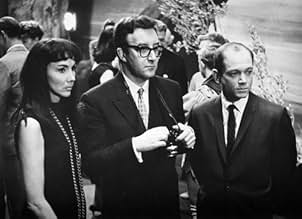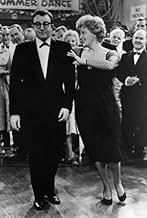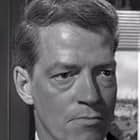A middle-aged college professor becomes infatuated with a 14-year-old girl.A middle-aged college professor becomes infatuated with a 14-year-old girl.A middle-aged college professor becomes infatuated with a 14-year-old girl.
- Nominated for 1 Oscar
- 2 wins & 9 nominations total
Terry Kilburn
- Man
- (as Terence Kilburn)
Featured reviews
Vladimir Nabokov's 'Lolita' is a brilliantly written, beautifully constructed, hilarious (in a black-comedy way), poignant, luridly shocking (but not gratuitously so) and very daring for its time book.
Despite me considering it one of the finest books she's ever read, when describing it to people they often give me "is she mad?" looks due to its subject matter. Don't let the subject matter turn you off, no matter how it sounds, to me 'Lolita' is an essential read. Stanley Kubrick's film adaptation, which saw Nabokov's involvement, is not exactly faithful and elements are downplayed, but, considering how difficult to adapt the book is and how films had to deal with censorship constraints and studio interference often, Kubrick's film is a very brave and worthy attempt.
Kubrick's 'Lolita' also succeeds incredibly well on its own terms, reminding one of Kubrick's 'The Shining' where it is very far removed from the source material but was so much scarier, more atmospheric and more shocking than anything in the more faithful mini-series. It's not quite one of Kubrick's very finest (in a very solid career where to me his only misfire was his debut 'Fear and Desire) but it is one of his most fascinating. Quibbles are very few, with my only quibbles being some over-obvious back projection representing Nabokov's nightmarish vision and the Elstree locations even more so as a result of problems with the economy and censorship.
'Lolita' however is brilliantly shot, lit and made with incredible atmosphere and directed with Kubrick's unmistakable masterly touch, meticulous but not as cold as some of his critics have criticised his directing and films for being. It's hauntingly and beguilingly scored too with a memorable main theme. While one does miss some of the book's funniest moments and the subject matter is a little more shocking in the book (with the age gap being more believable), 'Lolita' achieves an ideal balance of hilarious black comedy and affecting drama.
The story is lurid, but in a sensually captivating way and never in a vulgar way. It is also relentlessly entertaining and has moments of genuine poignancy. The characters are intriguing and the acting is terrific. Sue Lyon, while slightly too old age-wise (only by a few years though), more than holds her own against her more famous colleagues and is positively alluring. In an incredibly bold career move, James Mason superbly brings cruelty and pathos (his begging at the end is heart-breaking) to Humbert, here a complex character rather than the total creep that he could have been in lesser hands than Mason's. Shelley Winters is riotous and surprisingly poignant, while ever the scene stealer Peter Sellers brilliantly steals every scene he's in in multiple roles, especially great as Quilty, a creepy chameleon sort of character.
Overall, a fascinating film and gets better and funnier with each viewing. Not one of my favourites, but one this reviewer appreciates highly. 9/10 Bethany Cox
Despite me considering it one of the finest books she's ever read, when describing it to people they often give me "is she mad?" looks due to its subject matter. Don't let the subject matter turn you off, no matter how it sounds, to me 'Lolita' is an essential read. Stanley Kubrick's film adaptation, which saw Nabokov's involvement, is not exactly faithful and elements are downplayed, but, considering how difficult to adapt the book is and how films had to deal with censorship constraints and studio interference often, Kubrick's film is a very brave and worthy attempt.
Kubrick's 'Lolita' also succeeds incredibly well on its own terms, reminding one of Kubrick's 'The Shining' where it is very far removed from the source material but was so much scarier, more atmospheric and more shocking than anything in the more faithful mini-series. It's not quite one of Kubrick's very finest (in a very solid career where to me his only misfire was his debut 'Fear and Desire) but it is one of his most fascinating. Quibbles are very few, with my only quibbles being some over-obvious back projection representing Nabokov's nightmarish vision and the Elstree locations even more so as a result of problems with the economy and censorship.
'Lolita' however is brilliantly shot, lit and made with incredible atmosphere and directed with Kubrick's unmistakable masterly touch, meticulous but not as cold as some of his critics have criticised his directing and films for being. It's hauntingly and beguilingly scored too with a memorable main theme. While one does miss some of the book's funniest moments and the subject matter is a little more shocking in the book (with the age gap being more believable), 'Lolita' achieves an ideal balance of hilarious black comedy and affecting drama.
The story is lurid, but in a sensually captivating way and never in a vulgar way. It is also relentlessly entertaining and has moments of genuine poignancy. The characters are intriguing and the acting is terrific. Sue Lyon, while slightly too old age-wise (only by a few years though), more than holds her own against her more famous colleagues and is positively alluring. In an incredibly bold career move, James Mason superbly brings cruelty and pathos (his begging at the end is heart-breaking) to Humbert, here a complex character rather than the total creep that he could have been in lesser hands than Mason's. Shelley Winters is riotous and surprisingly poignant, while ever the scene stealer Peter Sellers brilliantly steals every scene he's in in multiple roles, especially great as Quilty, a creepy chameleon sort of character.
Overall, a fascinating film and gets better and funnier with each viewing. Not one of my favourites, but one this reviewer appreciates highly. 9/10 Bethany Cox
A significant part of Stanley Kubrick's genius was his ability to translate a literary style into a visual one. It is demonstrated nowhere more brilliantly than in LOLITA and A CLOCKWORK ORANGE.
LOLITA is perhaps the more stunning accomplishment, in that Nabokov's style is complex and multi-layered. Yet Kubrick captures the effect of it in camera angles and movements, in timing and point of view.
The broadest layer of Nabokov's novel, the parable of the aging culture of Europe trying to revivify itself by debauching the seductive young culture of America, is really missing in the film. But everything else is there, despite the fact that the film departs from the exact events of the novel.
Not to say that the film depends on the novel. It stands by itself quite easily. But it succeeds brilliantly in conveying the ideas and feelings that are the core of the novel, and it does so in completely cinematic terms. If films are to be based on works of literature, this is the way to do it, and the way it is almost never done.
LOLITA is perhaps the more stunning accomplishment, in that Nabokov's style is complex and multi-layered. Yet Kubrick captures the effect of it in camera angles and movements, in timing and point of view.
The broadest layer of Nabokov's novel, the parable of the aging culture of Europe trying to revivify itself by debauching the seductive young culture of America, is really missing in the film. But everything else is there, despite the fact that the film departs from the exact events of the novel.
Not to say that the film depends on the novel. It stands by itself quite easily. But it succeeds brilliantly in conveying the ideas and feelings that are the core of the novel, and it does so in completely cinematic terms. If films are to be based on works of literature, this is the way to do it, and the way it is almost never done.
I think Stanley Kubrick was the only director who had any ideas of how to tackle a film version of Lolita. I also believe that he was the only director who could have succeeded, and I believe he did succeed. This film was everything I could have expected it to be, and maybe even a little more.
Shelley Winters' performance was wonderful! James Mason delivered a strong effort in a very difficult part to play. Peter Sellers was Peter Sellers, four or five times throughout the movie, but that's Peter Sellers, and that's why I am really starting to admire his work. The real surprise performance in this movie, however, came from Sue Lyon in the title role. Her intensity was incredible. She seemed perfectly natural as a teenage girl enjoying the attention of older men, or just men in general. You could really see the wheels turning in her head as she schemed her way from one situation to the other. Some have criticized that her Lolita was "too old" in comparison to the novel's Lolita. One could make that judgment, however, what twelve year old actress would have been able to provide the emotional depth required for the part? Let's face it, in literary adaptations, some license must be allowed. All in all, I thought it was a very good movie, and I would recommend it to anyone who enjoys the work of Stanley Kubrick and/or Peter Sellers.
Shelley Winters' performance was wonderful! James Mason delivered a strong effort in a very difficult part to play. Peter Sellers was Peter Sellers, four or five times throughout the movie, but that's Peter Sellers, and that's why I am really starting to admire his work. The real surprise performance in this movie, however, came from Sue Lyon in the title role. Her intensity was incredible. She seemed perfectly natural as a teenage girl enjoying the attention of older men, or just men in general. You could really see the wheels turning in her head as she schemed her way from one situation to the other. Some have criticized that her Lolita was "too old" in comparison to the novel's Lolita. One could make that judgment, however, what twelve year old actress would have been able to provide the emotional depth required for the part? Let's face it, in literary adaptations, some license must be allowed. All in all, I thought it was a very good movie, and I would recommend it to anyone who enjoys the work of Stanley Kubrick and/or Peter Sellers.
I sat to watch Lolita for the third time. The first time I was too young to truly understand what I was seeing. Then I read the book a few years later and saw the film again. That time it left a mark. I detested James Mason's Humbert Humbert to such a degree that stopped me from accepting him in other roles other than utter villains. To see it now after two decades is a whole other story - All of a sudden James Mason's Humbert Humbert has become human, very human. Corrupt and haunted by the awareness of his own weakness. What a performance. Shelley Winters is superb, unafraid and bold bringing to life an embarrassing human spectacle. What a performance. Peter Sellers is chilling in all of his Quilty incarnations. Sue Lyon is sublime as the innocent torturer. Stanley Kubrick never made 2 films alike but I'm starting to suspect that as literary adaptations go, this is his finest.
8/10
Kubrik's version of Nabokov's tale of a middle-aged professor's self-destructive obsession with a young schoolgirl. Making a film that dealt with underage sex was considered impossible in 1962 due to the strict censorship regulations. Kubrik manages to get round this by merely alluding to sexual encounters and subtle wordplay and symbolism creeps into several scenes. He also raises the girl's age from 12 in the novel to 14 in the film. Lolita is also rich in Kubrik's trademark dark humour.
The three central characters of the novel are all portrayed more than adequately in the film; James Mason as the smitten professor, Shelley Winters as the suburban widow with pretensions of culture and Sue Lyons as the young nymphet. However, it is Sellars' performance as the creepy eccentric Clare Quilty (a relatively minor character in the book) that steals the show and, ultimately, makes the film. The opening scene (which is the ending of the film) is an outstanding testament to his talent and versatility. The said scene gives the film the same "circular structure" used by David Lean in "Brief Encounter".
My favourite moments include; Quilty's re-introduction to the film at the school's summer ball as the camera pans across the dancefloor and subtly reveals a look of comic ambivalence on his face as he dances with his lover, Humbert awkwardly trying to book the only remaining hotel-room at the police convention and Humbert again trying to teach the cynical Lolita the joys of Edgar Allen Poe's poetry.
I thoroughly recommend this film. My only complaint is the length - the final third seemed to drag a bit.
Kubrik's version of Nabokov's tale of a middle-aged professor's self-destructive obsession with a young schoolgirl. Making a film that dealt with underage sex was considered impossible in 1962 due to the strict censorship regulations. Kubrik manages to get round this by merely alluding to sexual encounters and subtle wordplay and symbolism creeps into several scenes. He also raises the girl's age from 12 in the novel to 14 in the film. Lolita is also rich in Kubrik's trademark dark humour.
The three central characters of the novel are all portrayed more than adequately in the film; James Mason as the smitten professor, Shelley Winters as the suburban widow with pretensions of culture and Sue Lyons as the young nymphet. However, it is Sellars' performance as the creepy eccentric Clare Quilty (a relatively minor character in the book) that steals the show and, ultimately, makes the film. The opening scene (which is the ending of the film) is an outstanding testament to his talent and versatility. The said scene gives the film the same "circular structure" used by David Lean in "Brief Encounter".
My favourite moments include; Quilty's re-introduction to the film at the school's summer ball as the camera pans across the dancefloor and subtly reveals a look of comic ambivalence on his face as he dances with his lover, Humbert awkwardly trying to book the only remaining hotel-room at the police convention and Humbert again trying to teach the cynical Lolita the joys of Edgar Allen Poe's poetry.
I thoroughly recommend this film. My only complaint is the length - the final third seemed to drag a bit.
Storyline
Did you know
- TriviaPeter Sellers modeled the voice of his character Clare Quilty on that of his director, Stanley Kubrick.
- GoofsDirector Stanley Kubrick walks out of the very first interior shot (center to right bottom) of Humbert entering Quilty's house.
- Quotes
Charlotte Haze: Do you believe in God?
Humbert Humbert: The question is does God believe in me?
- Crazy creditsThe credits are played over footage of Lolita's toenails being painted.
- Alternate versionsThe scene where Lolita first "seduces" Humbert as he lies in the cot is a good 10 seconds longer in the British cut of the film. In the U.S. cut, the shot fades as she whispers the details of the "game" she played with Charlie at camp. In the U.K. print, the shot continues as Humbert mumbles that he's not familiar with the game. She then bends down again to whisper more details. Kubrick then cuts to a closer shot of Lolita's head as she says "Well, allrighty then" and then fades as she begins to descend to Humbert on the cot. The British cut of the film was used for the Region 1 DVD release.
- ConnectionsEdited into Hai-Kubrick (1999)
Details
Box office
- Budget
- $2,000,000 (estimated)
- Gross worldwide
- $7,411
- Runtime2 hours 33 minutes
- Color
- Aspect ratio
- 1.66 : 1
Contribute to this page
Suggest an edit or add missing content





































